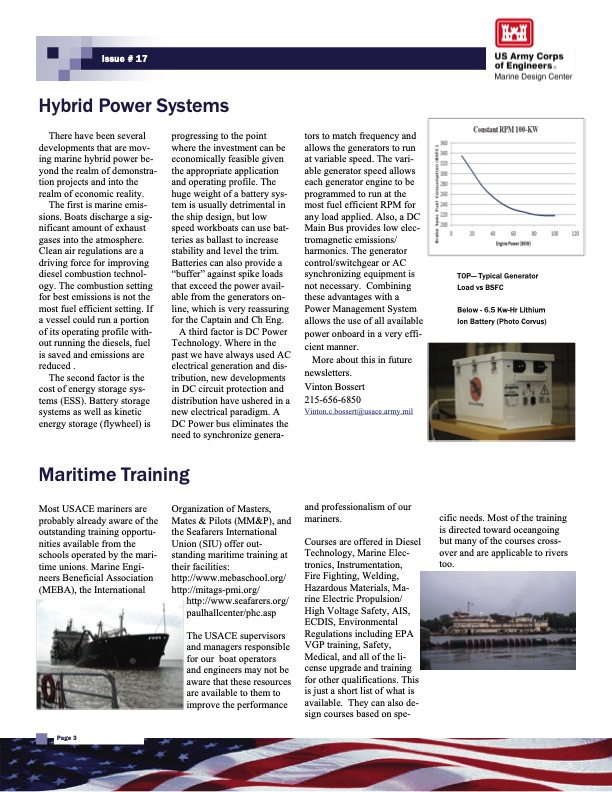
PDF Publication Title:
Text from PDF Page: 003
Issue # 17 Hybrid Power Systems There have been several developments that are mov- ing marine hybrid power be- yond the realm of demonstra- tion projects and into the realm of economic reality. The first is marine emis- sions. Boats discharge a sig- nificant amount of exhaust gases into the atmosphere. Clean air regulations are a driving force for improving diesel combustion technol- ogy. The combustion setting for best emissions is not the most fuel efficient setting. If a vessel could run a portion of its operating profile with- out running the diesels, fuel is saved and emissions are reduced . The second factor is the cost of energy storage sys- tems (ESS). Battery storage systems as well as kinetic energy storage (flywheel) is progressing to the point where the investment can be economically feasible given the appropriate application and operating profile. The huge weight of a battery sys- tem is usually detrimental in the ship design, but low speed workboats can use bat- teries as ballast to increase stability and level the trim. Batteries can also provide a “buffer” against spike loads that exceed the power avail- able from the generators on- line, which is very reassuring for the Captain and Ch Eng. A third factor is DC Power Technology. Where in the past we have always used AC electrical generation and dis- tribution, new developments in DC circuit protection and distribution have ushered in a new electrical paradigm. A DC Power bus eliminates the need to synchronize genera- tors to match frequency and allows the generators to run at variable speed. The vari- able generator speed allows each generator engine to be programmed to run at the most fuel efficient RPM for any load applied. Also, a DC Main Bus provides low elec- tromagnetic emissions/ harmonics. The generator control/switchgear or AC synchronizing equipment is not necessary. Combining these advantages with a Power Management System allows the use of all available power onboard in a very effi- cient manner. More about this in future newsletters. Vinton Bossert 215-656-6850 Vinton.c.bossert@usace.army.mil TOP— Typical Generator Load vs BSFC Below - 6.5 Kw-Hr Lithium Ion Battery (Photo Corvus) Maritime Training Most USACE mariners are probably already aware of the outstanding training opportu- nities available from the schools operated by the mari- time unions. Marine Engi- neers Beneficial Association (MEBA), the International Organization of Masters, Mates & Pilots (MM&P), and the Seafarers International Union (SIU) offer out- standing maritime training at their facilities: http://www.mebaschool.org/ http://mitags-pmi.org/ http://www.seafarers.org/ paulhallcenter/phc.asp The USACE supervisors and managers responsible for our boat operators and engineers may not be aware that these resources are available to them to improve the performance and professionalism of our mariners. Courses are offered in Diesel Technology, Marine Elec- tronics, Instrumentation, Fire Fighting, Welding, Hazardous Materials, Ma- rine Electric Propulsion/ High Voltage Safety, AIS, ECDIS, Environmental Regulations including EPA VGP training, Safety, Medical, and all of the li- cense upgrade and training for other qualifications. This is just a short list of what is available. They can also de- sign courses based on spe- cific needs. Most of the training is directed toward oceangoing but many of the courses cross- over and are applicable to rivers too. Page 3PDF Image | USACE MARINE DESIGN CENTER Newsletter

PDF Search Title:
USACE MARINE DESIGN CENTER NewsletterOriginal File Name Searched:
MDC-Newsletter_17.pdfDIY PDF Search: Google It | Yahoo | Bing
Development of a solar powered Electric Ship The Electricship website originally started off as a project to develop a comprehensive renewable, affordable, modular electric ship... More Info
Modular Boat Hull Composite The case for a unsinkable, modular composite hybrid boat hull... More Info
MS Burgenstock Hybrid Electric Catamaran Lake Lucerne Unique shuttle servicing Lucerne to the Burgenstock Resort... More Info
Ground Power Unit GPU Powered by Lithium Ion Batteries The goal of the Ground Power Unit is to provide a readily accessible, modular, ready-to-power solution for remote power... More Info
| CONTACT TEL: 608-238-6001 Email: greg@electricship.com | RSS | AMP |